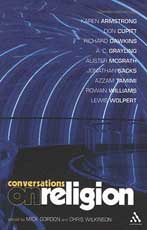"I spend time in my study constantly reading sacred texts, or texts about God, and I will get milliseconds of wonder and awe and delight. And Rabbi Blue — who used to be a colleague of mine when I taught at a Rabbinical college — told me that this is what Jews do when they study the Torah and Talmud. They don't talk to God in the way that Christians do, but they study. And the method of study in a traditional yeshiva, through argument, question and answer, is part of the spiritual process that gives you those moments of, as it were, rapture — the sort of thing that you might get in a concert hall or at a night club. But it must be translated into practical action. The Buddha says: 'After receiving enlightenment you must go back to the marketplace and practise compassion for all living beings.'
"For me, my study taught me about first: ecstasy, and second: compassion. Because when I was studying a twelfth-century mystic, or a seventh-century prophet like Muhammad — from a sceptical angle initially — I realized that I had to put clever post-Enlightenment Karen on the backburner and enter the minds of these people with a completely different mindset if I was going to understand what they were about. It was no good poncing around from the point of view of the twenty-first century. You have to enter, in a disciplined, scholarly way, into another worldview. It's the same as when you are interpreting a great piece of literature of the medieval period or from ancient Egypt. It is no good saying: 'This is all rot because I don't understand the symbols.' So I had to leave myself and my worldview behind. And that is what ecstasy is. And I had to feel with the other. And that is what compassion is. I had to stop myself making simplistic judgements. And that changed me quite a bit because I used to be a very, angry person, I was filled with rage. I'd learnt at my reverend mother's knee and at Oxford how to cut people down to size, how to make cruel quips, etc. And I found I couldn't do that any more. My work, my practice, was rubbing off. The endless discipline of leaving my simplistic judgements behind and entering into something else and learning from it meant that I wasn't able to live in quite the same way in the real world. And I also learnt that right across the board the essence of religion is not about particular beliefs, it is about the golden rule. And every single one of the major world faiths has enunciated the golden rule and all say that it is the bedrock of faith or spirituality. And the golden rule is: Don't do to others what you would not like them to do to you. Look into your heart, discover what it is that gives you pain, and then refuse, under any circumstance whatsoever, to inflict that pain on anybody else. Confucius was the first person to enunciate it as far as we know. Five hundred years before Christ. And he said that it was the thread that pulled all his teaching together. And it was something that his followers should practise all day and every day. Jesus taught a version of the golden rule.
"My favourite version of it comes from an early rabbi, Rabbi Hillel, who was an older contemporary of Jesus. One day Rabbi Hillel was approached by a pagan who promised that he would convert to Judaism if the rabbi would recite the whole of Jewish teaching while he stood on one leg. And Rabbi Hillel stood on one leg and said: 'That which is hateful to you, do not do unto your neighbour. That is the Torah, everything else is commentary. Go and study it.' And that is an extraordinary statement. That is Judaism. That is the Torah. That is the whole of Jewish teaching. There is no mention of God, no mention of the creation of the world, no mention of Mount Sinai or the 613 commandments, or the promised land, or the exodus to Egypt; because that is all just commentary on the golden rule. And it is a behavioural thing. Once you start behaving like this, as Confucius said, all day and every day, then you begin to understand. You leave yourself behind, you dethrone yourself from your world and put another there, and you achieve transcendence from selfishness, and that is what God is."
